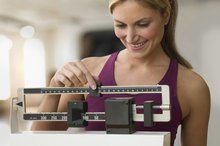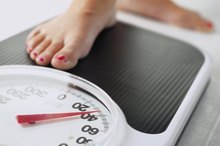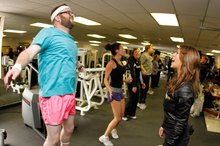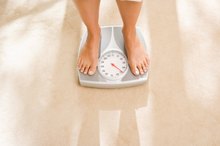What Is the Average Caloric Intake for a 30-Year-Old Man?
Men’s caloric needs peak at about age 25 and then decline over the years. If you’re a 30-year-old man on the same diet that you had five years ago, you might not notice these body changes until you begin to gain weight. The U.S. Department of Agriculture reports that many American diets reflect this calorie imbalance, as evidenced by the rise in obesity. The ideal caloric intake equals your caloric output through activity. The USDA estimates this average caloric need for men 30 years of age at 2,600 calories per day.
Body Mass Index
To learn whether you are overachieving in the area of calorie consumption, calculate your body mass index, or BMI. Record your height in inches and your weight in pounds. Multiply your weight by a factor of 703. Divide the result by your height, and divide that result by your height again. This is your BMI, which is in the healthy range at 18.5 to 25, and underweight or overweight below or above those figures. The National Institutes of Health note that bodybuilders may need a medical assessment of body mass and weight.
- To learn whether you are overachieving in the area of calorie consumption, calculate your body mass index, or BMI.
Calorie Level
How to Use Your BMR to Lose Weight
Learn More
Food label information will help you calculate your current average caloric intake. Note the calories per suggested serving of the foods that you eat in a day, and increase that amount if you typically eat more. Weight maintenance at this level of consumption means that you are meeting your personal caloric needs without any excess or shortage. Weight gain may be due to a combination of your body’s decreased calorie needs and your diet’s calorie surplus.
- Food label information will help you calculate your current average caloric intake.
- Weight maintenance at this level of consumption means that you are meeting your personal caloric needs without any excess or shortage.
Lifestyle
If you’re gaining weight at your current caloric level, you’ll need to alter your diet, your exercise plan, or both. In order to stay at a healthy weight for your height and age, you need to expend all the calories that you get from food. Sedentary men may only be able to burn 2,400 calories a day. Thirty-year-old men who play high-intensity sports may need as many as 3,000 calories per day to sustain their weight. To reach caloric balance on an average diet of 2,600 calories, the U.S. Department of Health and Human Services advises 150 minutes of moderate exercise per week in addition to normal daily activities.
- If you’re gaining weight at your current caloric level, you’ll need to alter your diet, your exercise plan, or both.
- In order to stay at a healthy weight for your height and age, you need to expend all the calories that you get from food.
Significance
Recommended Daily Allowance for Calories
Learn More
Gaining a few pounds may not seem like a big deal at age 30. Failing to lose those pounds, however, and adding more to your weight through the same diet and exercise habits can shorten your life. According to the Office of the Surgeon General, men with a BMI of 25 to 30 or greater have an increased risk for potentially fatal heart disease, type 2 diabetes and prostate cancer.
Related Articles
References
- U.S. Department of Agriculture; Dietary Guidelines for Americans; December 2010
- National Institutes of Health; Body Mass Index; May 2011
- U.S. Department of Health and Human Services; Physical Activity Guidelines for Americans; 2008
- Office of the Surgeon General; Overweight Consequences; January 2007
- Sharma HB, Kailashiya J. Gender difference in aerobic capacity and the contribution by body composition and haemoglobin concentration: a study in young indian national hockey players. J Clin Diagn Res. 2016;10(11):CC09–CC13. doi:10.7860/JCDR/2016/20873.8831
- Brightwell CR, Markofski MM, Moro T, et al. Moderate-intensity aerobic exercise improves skeletal muscle quality in older adults. Transl Sports Med. 2019;2(3):109–119. doi:10.1002/tsm2.70
- American College of Sports Medicine. Protein Intake for Optimal Muscle Maintenance.
- Bellemare F, Jeanneret A, Couture J. Sex differences in thoracic dimensions and configuration. American journal of respiratory and critical care medicine. 2003;168(3):305–12.
- Dilgate Muth, Nathalie, MD, MPH, RD. Do men and women have different nutritional needs? American Council on Exercise. March 21, 2012.
- Lewis D, Kamon E, Hodgson J. Physiological differences between genders. Implications for sports conditioning. Sports medicine (Auckland, N.Z.). 1986;3(5):357–69.
- Protein Intake for Optimal Muscle Maintenance, American College of Sports Medicine, (2015).
Writer Bio
Nancy Clarke began writing in 1988 after achieving her Bachelor of Arts in English and has edited books on medicine, diet, senior care and other health topics. Her related affiliations include work for the American Medical Association and Oregon Health Plan.









